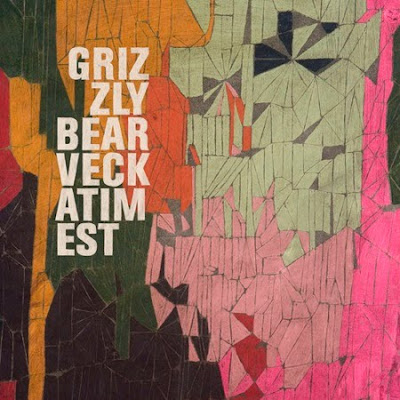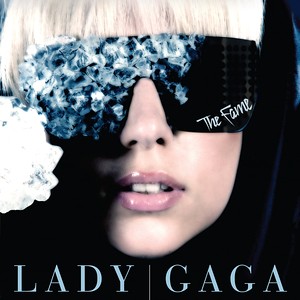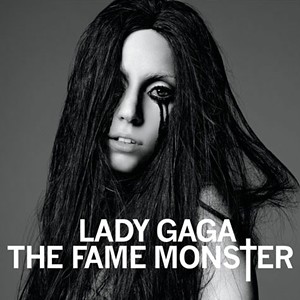Lady GaGa - The Fame (2008) / The Fame Monster (2009)
The past 24 hours of arch-pop blaring from the windows of the house de fleur have been quite a break from the usual stream of choice '94 "Tweezer" jams and scratchy DIY GBV recordings, Coltrane solos and Steve Reich Phases that I normally allow to publicly escape my sound bubble and craft the public opinion of what-that-guy-in-that-house-listens-to. All in the interest of maintaining the mystique, ya? Um, no. When someone, let's call him "Enter Sandcounty Man," requested that I review Lady GaGa's double album reissue of epitome-of-glitz-pop, he did so with all kinds of "now don't laugh" and "this should be a change" qualifications. But as much as I love me some, e.g., Built to Spill, I also have to throw out that There's Nothing Wrong With Pop. I mean, yes, there's something wrong with a lot of pop, that whole mindless pandering to the masses thing, or more exactly, the mindless acceptance by said masses of half-assed derivation. But pop (or, say, Pop!, said the Erasure fan) as a genre distinction and not just a declaration of album sales, can be brilliant. Not independent artist brilliant, not musical genius brilliant, but brilliant by its own tight-craft standards of the catchy, contained and attention-seizing.
So screw that "guilty pleasure" notion. I'll just ignore the comments of passers-by - "Oh, some thirteen year-old who identifies with Lady GaGa's outsider narrative must live in that house" - and enjoy these tunes de GaGa that I am so clearly enjoying. Those earworms are catchy for a reason, eh, and while the empty calories of a thumping bassline and dance-your-cares-away anthemic choruses may be just candy, well, um, candy tastes good. And ftr, the GaGa is a damn fine confectioner.
On that loosely connected metaphor, it's also worth noting that millions of marketing dollars go into candy packaging, so much so that it almost overwhelms the candy itself*. The packaging, natch, can make the candy, and this is certainly a pretty played notion when talking about pop music acts. But Lady GaGa is one of those cases where it makes no sense to even consider the music apart from the singer/packaging - the artist's work is interlaced with her videos, the albums and songs mere pieces in a larger fashion/idea show, all of it presented by an artist so mixed in the pop culture concept of celebrity that her DEBUT album is called The Fame. The overall Lady GaGa Project is a sort of multimodal affair, where to get a grasp of what she's up to involves taking in the whole scene. All of it, the insane wardrobe choices, the hypersexual-yet-ambiguously-so front, the chameleon aspect of her styles (both musical and iconic), are key. Her much, much larger-than-life gestalt renders melodies not just catchy but emphatic, corporeal statements, completely dominant of the local soundspace (and it doesn't hurt that the industrial disco metallic synth sound - you *have* to know what I'm talking about - is an implicitly overwhelming sound). So while I usually angle these album reviews at the experience of the album, the candy not the package, that doesn't really work for this / these two GaGa entries. They seem much more about the feel of the album blasted in the club, over the car stereo and out in the ether than the particular experience of close-listening over headphones in the study.
* - You could stretch the analogy to point out that the constant formula adjustments of candy products - dark chocolate peanut butter cups, crunchy peanut butter cups, peanut butter chocolate sticks, inside out peanut butter cups* (damn, Reese!) - mirror the attempts to keep up with the fickle tastes of pop consumers.
** - My favorite marketing claim of late? "Now Better Tasting." Think on that for a bit - a claim to superiority over itself, and a claim that tells you nothing. Better how? Saltier? Sweeter? Or just "releases more dopamine upon consumption?" I know it's not much different from the "new and improved" claim of old. But there just seems something about is as a response - "I'd like to eat more your food, sir, but I would like it to taste better/ "Well, guess what? Now it is better tasting!" / "Well, that certainly worked out!" - that cracks me up.
Sadly enough, I am ill-equipped to evaluate the packaging for two reasons. One, given that Lady GaGa is an absolute megaspectacle, I am sure people have covered this angle ad nauseum. I can give you the basics - she's a classically trained music student who attacked the NYC club world, she's very musically talented but also a master of the entire demonstration as a work of performance art, and she (at least claims to) wants to let her freak flag fly sans restriction so as to let the high schoolers out there in the margins know that it's okay, there are people out there just. like. them. It's much more detailed a storied than that, but that's the basic gist - real music first, chic scene second, this pop craft third. And somewhere in there is that she's a huge friend of the LGBT community and embraces a couture aesthetic. A succinct way to think about it is that she's a fairly normal, educated person who acts off-puttingly weird in an intentional way that knows it's patently intentional and comes to symbolize all that is cool, sexy, and weird-kid friendly. While wearing clothes made of dead Kermits. AND on top of all of this, she's a shape-shifter who never shows the same face twice. Got it? See, I told you I'm not qualified. Since that succinct way failed to be succinct, think of this way instead: she's an icon sans features, robotic space age cool with sounds from the future and all, but you'll never pin her down beyond that. Keeping it real is keeping it ever-changing, with the only consistency being that it's BIG, FAMOUS and AWESOME.
That's my impression anyways. Because two, I'm largely not with it enough w/r/t the contemporary pop era to hang with the nuances of every move she makes. Yes, it's true; things are passing me by. I surely get that this reeks of postmodern synthesis - multiple styles, ironic disdain for "the scene" while creating it, insisting on representing the fringes of what is cool and acceptable while simultaneously becoming its center. A pop-star at essence because there is no *real* Lady GaGa, so the act can become whatever pop requires. I get all that, and I *really* get the influences she's milking - Madonna, Peaches, Gwen Stefan, EuroClub, disco diva - those shine through. But as far as trying to keep track of the daily what she's doing, how she relates to the other female artists of her own time... well, this ain't my scene, man. All I can do is throw her hit discs on and enjoy them over headphones in the study. So in a way I am, indeed, not really the target audience. So it goes.
I will latch onto three aspects of GaGa before I hit the albums. They are:
1. Lady GaGa as hero*. Christina Aguilera's "Beautiful" is a lovely ditty that was life-affirming in isolate, but once it became an anthem for the LGBT community and oppressed and/or down-trodden individuals generally, it took on a huge power. There's meaning in the pop sometimes, and similarly, whether "real" or not, LG's approach/message of "be thyself, screw what 'they' say" has positively affected a whole ton of people. It's hardly original - I mentioned somewhere else that this is severely trod-upon, David Bowie and Rocky Horror ground - but it clearly speaks to a certain segment of the new outcasts population. And as a weirder-sympathizer and someone who definitely latched onto music as a means of solace, I fully support that angle. It could be wholly insincere - there's really no telling with an ironic tornado like LG - but the effect is, at least in part, a good one.
* - There's also an aspect that LG is sort of a style hero, introducing all kinds of people who would otherwise never be exposed to high concept fashion, performance art, foreign styles of music, etc. It seems like a weird thing to note, but a lot of reviews say things like "she's unoriginal, but I'm happy she's introducing the masses to couture." Which is a roundabout way of saying, I suppose, that she's an effective mass-marketer?
2. Lady GaGa as chameleon. I already mentioned the personal appearance / style thing, but what's more striking is the lack of an identity in the music - the styles are all over the place (again, the exception being that the synth sound is fairly pervasive), but even the vocals are radically different from track to track. It's a sophisticated twist on the pop notion of identity - not just a refusal to be pinned down, but a refusal to be anything in particular. Again, it's trod-upon Madonna/Britney/Michael Jackson territory, but as
Pitchfork reviewer Scott Plagenhoef notes, it's occuring at "internet speed." It makes for a decentered pop act, something that challenges concepts of branding and iconography nicely. I.e., outside of the disc jockey saying "here's the new Lady GaGa song," I'm not entirely sure how one knows it's she.
3. Lady GaGa as derivative. With so many influences on sleeves - and I'll let you play the "spot them" game, but that above-linked Pitchfork review nails the ones on The Fame Monster - the urge to accuse her of sampling-esque unoriginality is there. Indeed, many critics cite "nothing new" as a complaint. In my book, this seems to miss the point. One, this is pop - derivative is the name of the game, at least on some level. Two, this just speaks to the holistic approach one needs to take with LG - the song qua song is just one aspect of the show, and even if it's genealogy is plainly showing, perhaps it hasn't been presented in the particular context before. Three, and this is sort of an offshoot of two, part of the context is that she can pull off ALL of these influences and meld them together. Maybe the only thing that LG shares with Phish is a seamless ability to genre-hop, and even if any one thing isn't particularly impressive, the string of channeled past stars is collectively mind-blowing.
And quickly, the albums. First, just to explain why I am putting them in the same review: The Fame came first in 2008, but 2009's The Fame Monster was originally conceived as a bonus disc for a reissue of the original album. The two pieces were different enough - and indeed, there's something darker and more coherent about the bonus disc than the original album - that LG changed her mind (or someone changed his or her mind) and released them separately. And then released them as a big double album, too, consolidating a lot of the different versions of The Fame (American European, Japanese bonus tracks, etc.). All of this, I have decided, is too much to keep track of, and since I acquired the whole thing as a The Fame/The Fame Monster package, I pretty much think of it as one sprawling entity.
The double album, then, wastes no time getting to the business of GaGa - club beeps and that fuzzy, huge synth sound blow the roof off "Just Dance," an energetic anthem piece that is a BIG HIT about the BIG CLUB life. Its tone matches its subject matter, and as mindless as it is, it deserves its reputation as one of the hugest hits of the year. And that's really (unsurprisingly) the gist of
The Fame - several single-ready, huge hit entries about celebrity buoyed by a mixed bag of filler. "Paparazzi" is probably the best concept song on there, a love song about obsession and pursuit (backed by a gorgeous video) that also has a divine, crystalline moment chorus. "Poker Face" is enough of a mind-brander that bands from all over the genre-map covered it; it's more of a Euro-disco meets Peaches piece with some arguably gratuitous sexual lyrics, but it grooves appropriately. "Lovegame" carries that same near-gratuitous label with all its "disco-stick" talk, and imho is not very exciting in its neu-Ace of Bass execution, though catchy enough to get the job done. The single that largely misses the mark is "Eh Eh [Nothing Else I Can Say]," a song that is pure pop sans club beat, almost evoking Cardigan's "Lovefool" or something in that wispy range.
One weird aspect of the LG sound, though, is that even the songs I don't like, I don't mind (or I even enjoy) hearing - that makes no sense, but there's enough interesting going off in each one that even the weaker or flawed entries tend to sit well with me. Some examples of these "bad songs that I still like" include "Beautiful Dirty Rich" (too whiny or something), "Money Honey" (plain riff and annoying chorus), "Boys Boys Boys" (nails on chalkboard grating in moments), and "Brown Eyes." This last one I enjoy almost because it's too ridiculous - it's a retread of the Mötley Crüe hit "Home Sweet Home" and some kind of weird Beatle-esque guitar riff. So it's on face preposterous, and yet I hum it! This is not to say the album is all bad catchy moments - "The Fame" (a cool Basement Jaxx meets Sheryl Crow vibe), "Again Again" (solo piano soul a la Alicia Keys, sort of), and "Summerboy" (which effortlessly channels No Doubt's best hepped up 21st century disco moments) all legitimately kick. So to sum up, the disc is a little uneven and all over the place, becomes frankly annoying in moments, and yet I have no trouble listening on repeat for hours. I like it even when I don't, which is a great sign.
The Fame Monster, if lacking the highest highs of the first disc, manages a more end-to-end coherent vibe. All of the tunes enhance the sophistication of her debut disc, plus the lead single, "Bad Romance," is the type of "sophomore" album effort that doesn't bat a lash in its declaration of here-to-stay. It's darker, more intricate than the previous singles, and gets delivered with a perfect cocky-snarl all the way up to its soaring, pleading, classic chorus. The Fame Monster features, too, some flat-out wacky homage moments - "Alejandro"'s silly melodrama is only lacking a declaration of something in the air that night in terms of ABBA genealogy, and "Speechless" is an awkward ballad that makes you wonder if LG will don a little mustache to sing this Queen ditty in concert. But those questionable steps aside, the remainder is thoroughly solid; "Telephone" is a pulsing, syncopated rhythm-driven club explosion*, "Dance in the Dark" is a sheen epic that echoes of New Order levels of bounce with a Cher-esque supervocal, and "Teeth" is as close as LG will get to a hip-hop stomper (it weirdly sounds like a coked-up chain-gang spiritual with diva attitude). Again, this whole second disc, even including those weird tracks, brings a dark, soupy complexity that strikes as a nice trend toward intricate but still immediate pop.
* - Albeit, again, one whose lyrics are about the club it's being played in? And Beyonce, what with her DirectTV shilling, almost makes this sound like a Boost Mobile commercial.
In a way, LG makes for a really easy review - great enough in moments to unhesitatingly recommend, undeniably an enjoyable experience even when it's bad, but so full of awkward and / or annoying moments that the rec gets qualified immediately. She does certainly sound, in her multi-genre/personality attack backed by supersynths, to be delivering pop from the near-future. And beyond that, it's multi-faceted music that, while often about the club, manages to hit on some of the sinister and complex sides of fame and the modern life. Even if it's only to render them grandiose and make money off of the cool-to-be-odd art concept, it's a lot more engaging and invigorating than your average club anthem. So let this double disc spin in your player for a bit, blast it out to the streets and let 'em know that the same house, the same guy can pump out tunes from both corners of culture and grab what he/she will from both, sans embarrassment.
Status: Recommended (solid)
Nyet's Faves: "Just Dance," "Bad Romance"



















